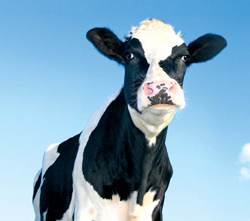Local and Organic Food It’s Good for Everyone

Buying locally-produced foods – especially organic – is good for the environment and good for us. Less energy is used in their transport than imports, and they come to us close to the time of their harvest – with their nutrients intact. “Buying local” also helps to support family farms, build communities and teach our children where their food comes from.
Instead of relying on pesticides and chemical fertilizers, organic farming uses thoughtful farm design and practices to create strong ecosystems. For a conventional farm to become certified organic, all chemicals and fertilizers need to work their way out of the land, the livestock and the crops. And organic farmers are required to manage their farms according to the Canadian Organic Standard.
On an organic dairy farm, cows are treated humanely with plenty of room to roam and socialize. They eat only certified organic pasture, hay and grains free of any synthetic chemicals and fertilizers, growth hormones, genetically modified organisms, animal by-products or medicated feed.
Canada’s largest organic dairy co-operative, Organic Meadow, has over 100 family farm members in Ontario. Partnering with farmers and processors across Canada, Organic Meadow produces certified organic milk, dairy products, eggs and grains for local markets.
“Our mission is to decrease the distance between our farmers and our customers,” says Organic Meadow founding member Ted Zettel. “We hope that soon our products made from local milk for local consumers will be available throughout the country.”
On Organic Meadow dairy farms, cows are often treated like members of the family and even given names. Is all the effort to produce organic milk worth it? Just ask Organic Meadow farmer Ron Vice. “Each day we are convinced that our decision to go organic has benefits for our land and our animals, and for sustaining our family farm,” says Ron. “These days the walk to the barn is more enjoyable, and we feel much more positive about our future.”



